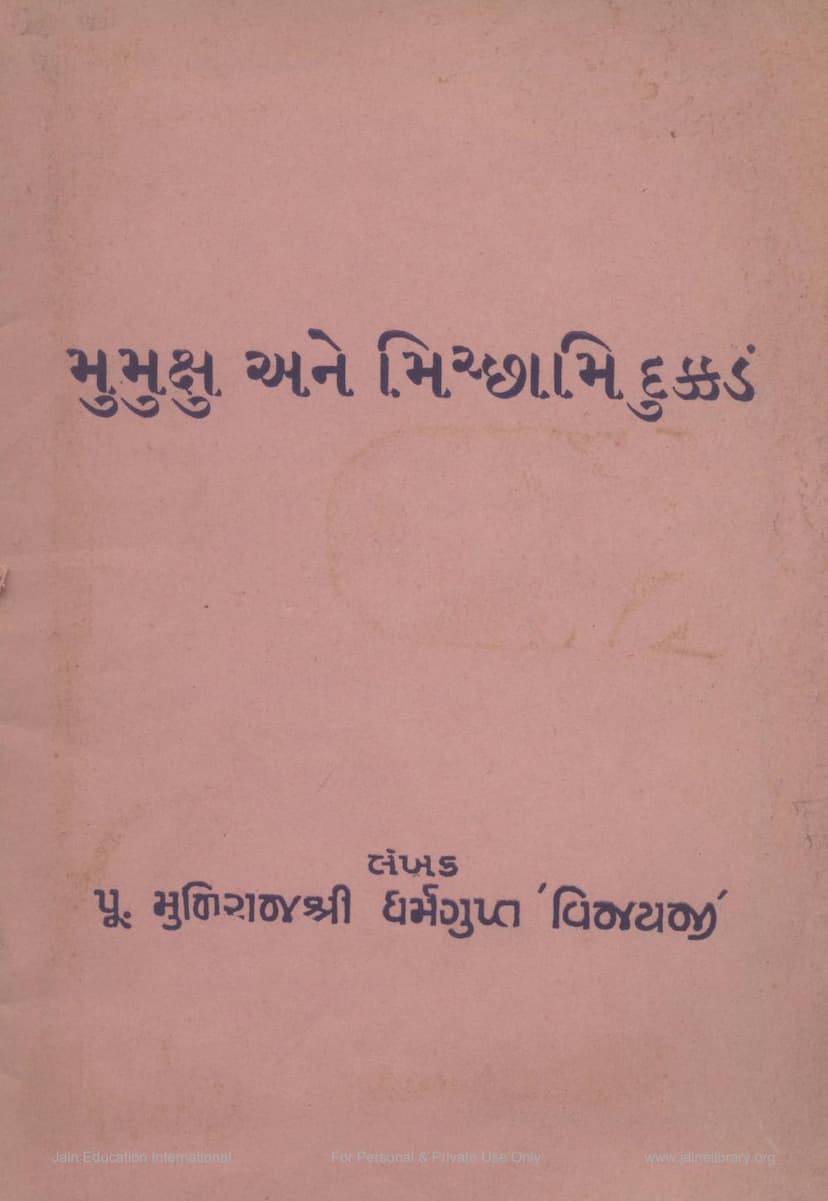Mumukshu Ane Micchami Dukkadam
Added to library: September 2, 2025

Summary
Here's a comprehensive summary of the Jain text "Mumukshu ane Micchami Dukkadam" by Dharmguptavijay, based on the provided pages:
Book Title: Mumukshu ane Micchami Dukkadam (The Seeker of Liberation and Micchami Dukkadam)
Author: Muni Shri Dharmguptavijayji Maharaj
Publisher: Shri Premsuri Jain Sahitya Prakashan Trust
Overall Theme: The book deeply explores the profound significance and practical application of the Jain mantra "Micchami Dukkadam" (I beg forgiveness for my wrongdoings), particularly for those on the spiritual path towards liberation (Mumukshu). It emphasizes that true spiritual progress is intrinsically linked to the practice of forgiveness and self-purification.
Key Concepts and Content:
-
The Intertwined Nature of Mumukshu and Micchami Dukkadam:
- The text asserts that a seeker of liberation (Mumukshu) and the practice of "Micchami Dukkadam" are inseparable, like a shadow to a body.
- Without "Micchami Dukkadam" holding a primary place in one's life, true Mumukshu status is questioned.
- "Micchami Dukkadam" is presented as an essential companion and tool for ascending the "Everest of Moksha" (liberation).
-
The Power of "Micchami Dukkadam":
- The mantra is described as a powerful weapon (amogha-astra) to uproot the vines of sin and the poison of negative emotions like anger.
- It's the key to purifying the soul from the ingrained impurities of passions (kashaya) accumulated over countless lifetimes.
- It facilitates the manifestation of virtues like forgiveness, humility, and gentleness, which are essential for spiritual advancement.
-
The Meaning and Components of "Micchami Dukkadam":
- The book delves into the etymological and philosophical meaning of each syllable of the six-letter mantra. This detailed breakdown is attributed to the scholarly work of Acharya Hemchandrasurishwarji Maharaj.
- Mi (મિ): Stands for humility and the abandonment of pride.
- Chha (ચ્છ): Means to stop wrongdoings; it implies ceasing the continuation of sins while chanting.
- Mi (મિ): Represents adherence to boundaries and discipline (maryada) in religious and moral conduct.
- Du (દુ): Signifies self-condemnation for committing wrongdoings (dushkrit). It involves introspective self-criticism and acknowledging one's sinful nature.
- kka (ક્ક): Implies the acceptance of one's past sins and faults. True acceptance without excuses or minimization is crucial.
- Da (દ): Denotes the firm resolve not to repeat the wrongdoings in the future.
- The book delves into the etymological and philosophical meaning of each syllable of the six-letter mantra. This detailed breakdown is attributed to the scholarly work of Acharya Hemchandrasurishwarji Maharaj.
-
The Depth of True Forgiveness:
- The text emphasizes that "Micchami Dukkadam" is not merely a verbal utterance but a deep internal process.
- It requires genuine remorse, self-condemnation, honest confession of faults, and a firm commitment to future restraint.
- A heart filled with disgust for sins, a strong desire for amendment, and a resolution never to repeat mistakes, even at the cost of one's life, are essential for its efficacy.
-
Practical Application and Guidance:
- The book is presented not just for reading but for swadhyaya (self-study and contemplation).
- It's recommended to recite "Micchami Dukkadam" with devotion in the morning and before sleeping, seeking forgiveness for past misdeeds.
- Regular reading, reflection, and meditation on the mantra are crucial for eradicating impurities and the cycle of rebirth.
-
Comprehensive List of Confessions (101 Examples):
- A significant portion of the book comprises an extensive list of 101 specific instances of wrongdoing, covering various aspects of spiritual, ethical, and social conduct.
- These confessions are addressed to the Divine, seeking forgiveness for actions or omissions related to:
- Disobedience to divine commands.
- Disrespect towards the Tirthankaras, their teachings, temples, idols, and holy places.
- Worship of other deities or deviating from the Jain path.
- Neglecting duties towards family, society, and the Jain order.
- Actions against virtuous individuals, monks, nuns, and lay followers.
- Self-indulgence, lack of discipline, and failures in spiritual practices like meditation, austerities, and vows.
- Harm caused to living beings (six-bodied organisms).
- Misunderstandings, wrong beliefs, and supporting false doctrines.
- Acts of deceit, betrayal, violence, and causing distress to others.
- Neglecting the study and practice of scriptures.
- Failing to uphold the principles of Jainism and the conduct of monks and householders.
- Pride, ego, envy, anger, and other negative emotions.
- Disrespect towards teachers, gurus, and elders.
-
The Role of the Author:
- The author, Muni Shri Dharmguptavijayji Maharaj, is presented as a disciple of Acharya Shri Bhuvanbhanusurishwarji Maharaj, who was a disciple of the esteemed Acharya Shri Premsurishwarji Maharaj.
- The author is described as having deeply internalized these spiritual principles, reflecting his own spiritual experiences and convictions in the book.
Overall Message and Purpose: "Mumukshu ane Micchami Dukkadam" serves as a practical guide and a profound spiritual treatise for Jain practitioners, especially those aspiring for liberation. It underscores the indispensable role of repentance, self-awareness, and the constant practice of forgiveness through "Micchami Dukkadam" in purifying the soul and progressing on the path of spiritual liberation. The detailed list of confessions aims to provide a comprehensive framework for self-examination and sincere repentance.